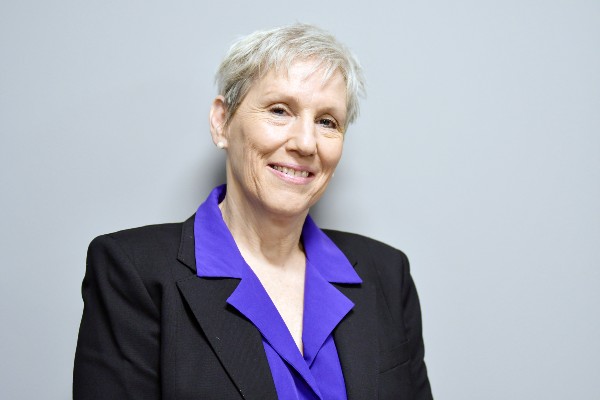Advancing the research agenda
June 28, 2021
Share

Queen’s is home to a dynamic community of researchers spanning all faculties and disciplines, and the Vice-Principal (Research) portfolio helps support and connect them while also seeking to enhance Queen’s profile as one of Canada’s top research-intensive universities. Since 2018, Kimberly Woodhouse has served as Queen’s Vice-Principal (Research). On June 30, her term ends, and she returns full-time to her role as professor of chemical engineering. As Vice-Principal Woodhouse prepares for the transition, the Queen’s Gazette connected with her to hear her thoughts on her time in that role and what’s next in her career.
What are you most proud of during your time overseeing the Vice-Principal (Research) portfolio for the past three years?
First of all, I’d like to say it’s been a privilege to serve the Queen’s community the past three years. And I want to thank all the different teams I’ve worked with across the university to move the research agenda forward.
There are many things that I am proud of, but a few specifically come to mind. One is the way in which the research portfolio has engaged with early-career researchers. We have restructured to support our new hires in their research programs and to get them up and running as quickly as possible. Their performance has been exceptional, and I believe the portfolio has contributed to the excellent success in the New Frontiers granting competition, which emphasizes interdisciplinary research.
The second initiative of particular note is the increase in the number of startups, new companies, and partnerships through the many FedDev programs, in particular the WE-CAN program. WE-CAN has done outstanding work in reaching out to the Kingston and eastern Ontario entrepreneurial community, particularly women, Indigenous women, and BIPOC entrepreneurs. This programming has rapidly accelerated over the last few years.
What advice do you have for early-career researchers who are starting down their own paths?
My advice is to engage as quickly as possible with the support systems in place in the Vice-Principal (Research) portfolio as they start to write their grant proposals. I also suggest they reach out to senior faculty members, particularly those who have been successful in receiving external funding, for mentorship and guidance. Along those lines, I want to thank the senior researchers across the university who have given so generously of their time to mentor our new researchers and to take part in our internal grants programs. We have hired many new faculty members over the past several years, and our senior faculty members have been instrumental in getting them up to speed.
As early-career researchers get more experience, I also suggest they find opportunities to get involved in grants panels so they can see examples of outstanding proposals.
They should also think about the broader research community around the world and who they would like to get to know and how they might want to work with them. Attending international conferences and seeking international funding opportunities are great ways to make these connections. It’s important to consciously network.
How has Queen’s changed in the time you’ve been here?
Since I came here in 2007, I would say that Queen’s has more strongly embraced research. Queen’s has always been a very strong research institution with very strong researchers, but there’s a greater recognition now that it’s part of the fabric of the university, particularly in the last few years.
Queen’s has also begun to understand the need to break down some institutional barriers in order to facilitate interdisciplinary research. There are now more opportunities for people to meet others from across the university and have more inter-faculty conversations around research.
Queen’s has also become less insular and more aware of the opportunities for the university to make strong positive impacts both nationally and internationally.
Now that your term as Vice-Principal (Research) is coming to an end, what’s next for you?
I’ll be on administrative leave, and I’ll be going back to the lab as a professor of chemical engineering. I’m looking forward to working more closely with graduate students and other faculty members.
I have two areas of research I’ll be focusing on. I’ll be working on projects in tissue engineering and regenerative medicine. I’m also working with an interdisciplinary group on health quality research.
Again it has been a great privilege to serve the research community over these last three years and a special thanks to all the members of the portfolio and across the research community who have worked so hard to move the research agenda of the university during these last three years.